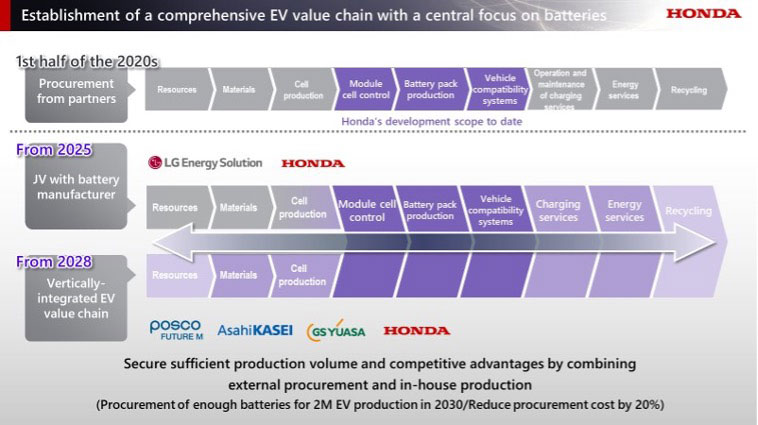
Honda is done standing by while rivals like Tesla and BYD steal market share. To stay competitive, Honda is doubling its investment in EVs to $65 billion (10 trillion yen) through 2030. The plans include slashing costs and launching seven new electric models.
Honda doubles its investment in EVs to $65 billion
CEO Toshihiro Mibe laid out the automaker’s new strategy Thursday, claiming Honda has not “changed its belief that EVs are the most effective solution.”
Honda believes it can compete in the small electric vehicle and motorbike segment. In the long term, Honda is confident that EV adoption will continue to rise. The company wants to take advantage of the “period of EV popularization,” which will happen in the second half of the 2020s.
To do so, Honda will introduce new EVs, establish a comprehensive supply chain (including batteries), and advance EV technology and facilities.
Through its new strategy, Honda aims for a 5% return on sales for its EV business in 2030, aiming to make it self-sustaining.
Honda’s new 0 series is expected to play a key role. Two new concepts, the Saloon and Space-Hub, were unveiled at CES in January.

The Saloon is set to become Honda’s new flagship EV with a model very similar to the concept launching in 2026. It will launch in North America first ahead of its global rollout.
Following the Saloon, Honda plans to launch seven EV models globally, from small to large. In China, Honda will introduce ten new EVs by 2027, representing 100% of auto sales in the region by 2035. It also unveiled its new “Ye Series” EVs to take on Chinese automakers like BYD.
Honda will launch a series of smaller EVs, starting with the N-Van e, a commercial mini EV. After it goes on sale in Japan this fall, Honda will introduce a series of small-size EVs in the region where needed. This will include personal mini-EV models in 2025.

Building an EV supply chain for the future
Regarding its supply chain, Honda will start by strengthening its partnerships for lithium-ion batteries while holding costs down. Starting in mid-2020, Honda will begin producing batteries with its JV partners.
In the US, Honda’s JV plant with LG Energy Solution will begin production with up to 40 GWh battery capacity annually. The lightweight and compact battery packs will be used for its 0 series EVs.
In the second half of the decade, Honda plans to further expand its battery business by building a vertically-integrated supply chain.
To do so, Honda will begin in-house production with GS Yuasa for EV batteries. Honda also plans to secure battery materials in Canada, like cathode materials from POSCO Future M and separators from Kasei at new JV plants.

By 2030, Honda aims to reduce the cost of EV batteries built in North America by over 20% compared to current costs. Honda already has enough secured to produce around 2 million EVs planned in 2030.
Honda aims for EVs and FCEVs to account for 40% of global auto sales in 2030 and 100% by 2040.
Electrek’s Take
Despite the recent “EV slowdown” the media continues to report, several automakers are increasing their investments now as they look toward the future.
Honda is the latest, joining Toyota, which has made a series of investments in new EVs, including a large electric SUV for the US and next-gen battery tech.
Although Japanese automakers have been laggards in the industry’s transition to EVs so far, with Ford, GM, VW, and others pulling back, could they turn things around? That’s what Honda (and Toyota) hope for with new investments in EVs.
Meanwhile, Honda and Toyota’s EV sales share is currently well under that of their rivals. While Toyota’s EV sales share is around 1%, many automakers are already achieving double-digit or 100% EV sales.
Will the new investments be enough? Drop us a comment below to let us know your thoughts.
